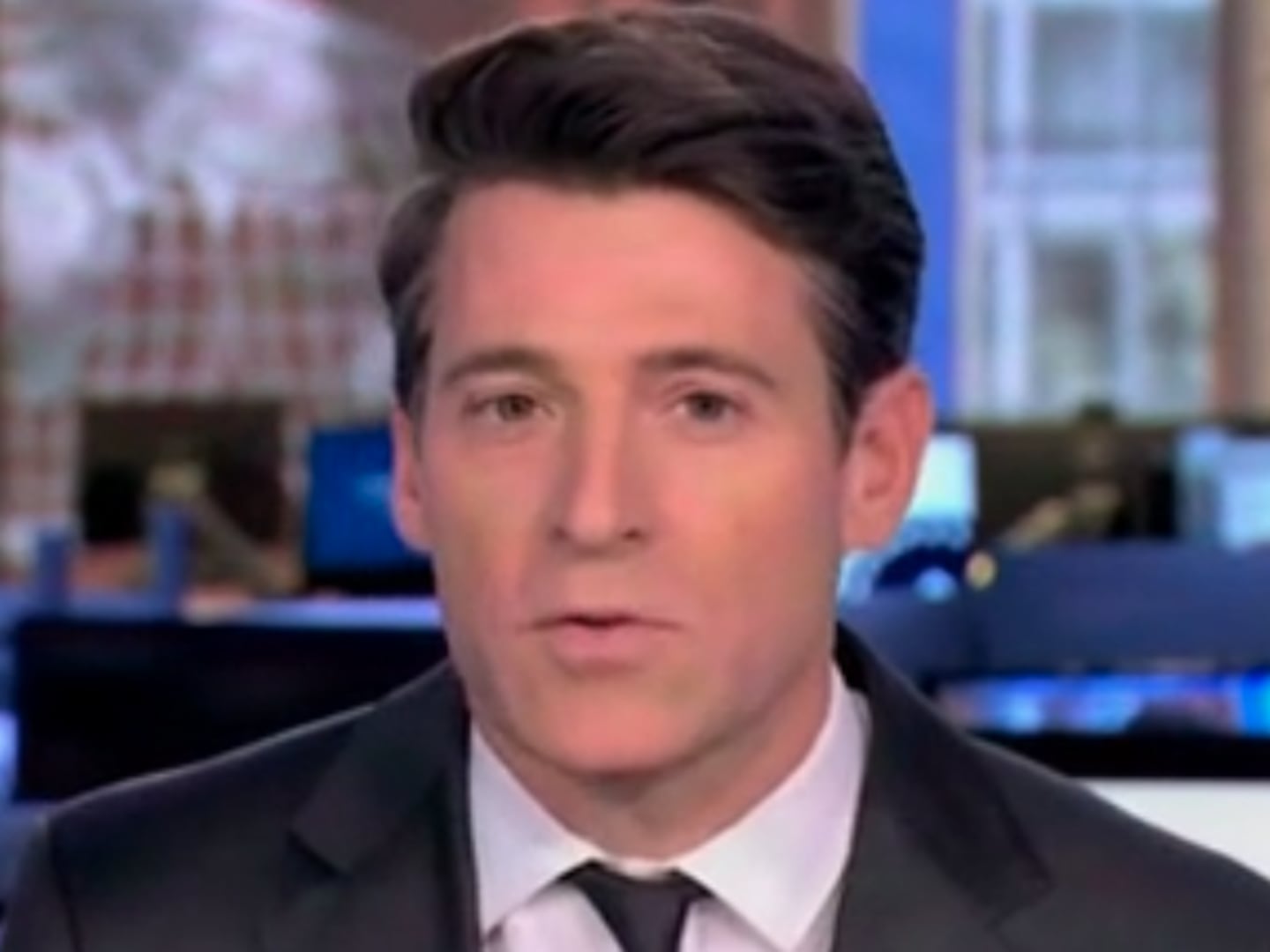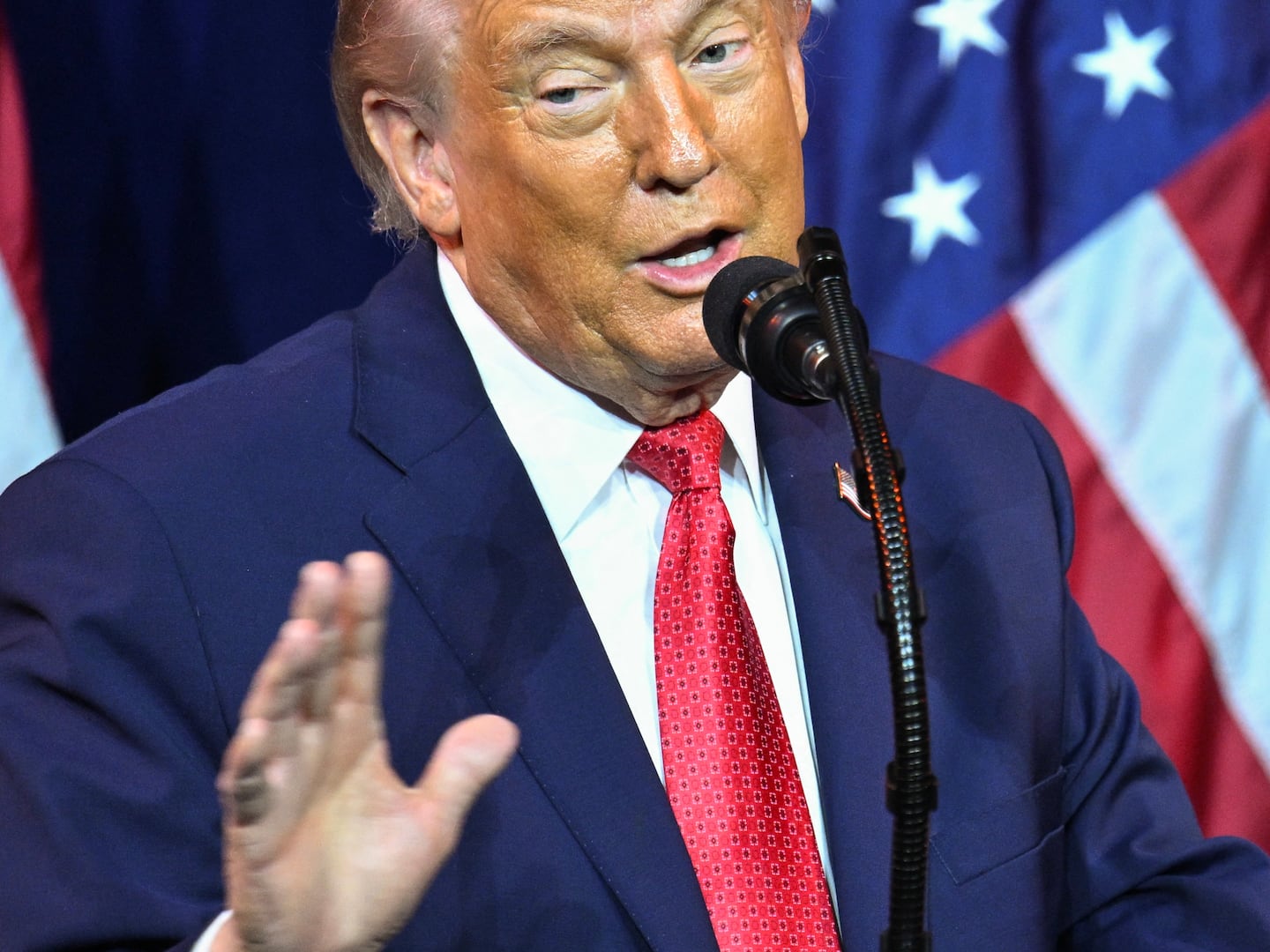The Russian presidential administration’s readout of the phone call was terse but telling. “Mr. Putin and Mr. Trump,” it stated, “both spoke of the need to work together in the struggle against the number one common enemy—international terrorism and extremism. In this context, they discussed issues related to solving the crisis in Syria.”
That marriage of true minds occurred on Nov. 14, exactly six days after the world began referring, however reluctantly, to Donald Trump as president-elect of the United States.
It was an unknown number of days after the New York real estate baron received what he described as a “beautiful” letter from his soon-to-be Russian counterpart, a man whose steadfast leadership he has professed to admire and whose regime is currently—although perhaps not for long—under U.S. sanctions owing to its invasion and occupation of parts of Ukraine.
Vladimir Putin’s military is also responsible, according to the Syrian Network for Human Rights, for killing more Syrian civilians in a single year than ISIS has managed to do in three-and-a-half years—and all in the name of combating what Putin calls “international terrorism and extremism.”
Not that Trump is aware of that latter statistic (he has, at times, been unaware of Russia’s invasion of Ukraine), and not that he would be much bothered by it even if he were. His Syria policy, such as it can be divined from his statements and claims on the hustings, and now in his turbulent transition period, has remained doggedly opposed to reality.
His handle on the contemporary Middle East is both a monochromatic caricature of the war on terror (“bomb the shit out of them”) and a semi-conscious regurgitation of authoritarian propaganda and disinformation, the sort of lies he doesn’t dismiss and many enemies of the United States have long hoped a Western leader such as him would swallow.
The so-called Islamic State, as Trump sees it, is the sole problem bedeviling a region teeming with intractable dilemmas and bloody conflicts. It is therefore the only natural security consideration for the United States. He told the Wall Street Journal that he does not trust the anti-ISIS Sunni Arab rebels the CIA and Pentagon have trained in Syria, whereas he places a lot of faith in the armies that have been killing both, often to the benefit of the ISIS fanatics.
“My attitude was you’re fighting Syria,” he said, “Syria is fighting ISIS, and you have to get rid of ISIS. Russia is now totally aligned with Syria, and now you have Iran, which is becoming powerful, because of us, is aligned with Syria. … Now we’re backing rebels against Syria, and we have no idea who these people are.”
It scarcely matters that “Syria” is here represented by a mass murdering dictator who has in the past instructed his intelligence services to dispatch jihadists into Iraq to blow up American soldiers, and more recently released al Qaeda veterans from his prisons, as he continues to trade with ISIS in oil, natural gas, weapons and electricity.
Of no apparent consequence, either, is the fact that U.S. spies and military officials have drawn a straight line from scorched-earth tactics deployed by the Syrian regime, Russia, and Iran, and the successive waves of Syrian refugees pouring into Europe and North America. This is the most politically and socially destabilizing mass migration the likes of which have not been seen since World War II, and yet which Trump seems to think it’s the work of the caliphate, not his future friend Assad.
Indeed, Trump’s telegraphing of executive intent to the Journal was sufficient to earn a cautiously happy reply from Bashar al Assad himself. “We cannot tell anything about what he’s going to do,” Assad said on Portugal’s RTP television channel, in an interview that aired Tuesday, following a rather successful reputation laundering press junket he allowed into Damascus. “But if… he is going to fight the terrorists, of course we are going to be an ally, a natural ally in that regard with the Russian, with the Iranian, with many other countries.”
Putin and Assad would surely welcome a realignment of the world’s only military superpower into the Damascus-Tehran-Moscow orbit—one which Trump blames the weakling Barack Obama for enabling even as he vows to work with it as a geopolitical fait accompli, making the United States a moral underwriter of that troika’s war crimes.
Trump’s worldview suffers from a major strategic contradiction: one cannot be both pro-Putin and anti-Ayatollah at the same time. Least of all in Syria.
“The Assad regime does not even have control over the military forces fighting in its name,” Jennifer Carafella, a Syria analyst at the Washington, D.C.-based Institute for the Study of War told The Daily Beast. “Iran has disproportionate control over pro-regime forces. So if the U.S. is talking about entering into an alignment with Assad or Assad plus Russia, it’s actually talking about entering into an alignment with Iran’s Revolutionary Guard Corps,” Carafella said, referring to the elite expeditionary force of the mullahs. Trump has blamed the incumbent president for enriching that same group, to America’s peril, by way of the Iran nuclear deal.
Perhaps it is precisely because of uncertainty about how Trump will square this forbidding circle that the jubilant reception his dark-horse victory prompted in Moscow a few days ago now appears to be giving way to a “creeping sense of buyer’s remorse,” as Oliver Carroll, the managing editor of The Moscow Times, said.
Yes, it’s true that the Russians feel they’ve “got their man,” as Carroll put it, but the brighter bulbs in Putin’s inner circle know that a Trump foreign policy can swing wildly in either or both directions, depending upon his top cabinet picks. Naming former U.S. Ambassador to the United Nations John Bolton as Secretary of State, for instance, would be met with something less than delight in the Kremlin, according to Carroll, given Bolton’s hawkish consistency on both Iran and Russia.
As such, Putin isn’t waiting around to see how things shake out. He’s busying with his own transition.
On Nov. 15, some 24 hours after Putin’s congratulatory phone call to Trump Tower, Russian Defense Minister Sergei Shoigu announced the start of a “large-scale operation to deliver strikes against terrorists” all across the Syria, relying both on Russia’s year-old Khmeimim air base in Latakia and its recent naval deployment in the Mediterranean. Kalibr cruise missiles have been fired from the Admiral Grigorivich frigate on targets in Idlib, Aleppo and Homs provinces. Su-33 and MiG 29K fighter jets have taken off from—and sometimes successfully landed on—Russia’s only aircraft carrier, the Admiral Kuznetsov.
Crucial to Putin, the design of Iranian Supreme Leader Ali Khamenei and Assad is to retake east Aleppo, a redoubt held by mixed rebel and jihadist forces for several years. The enclave’s fall would constitute a decisive morale and propaganda victory for Damascus, albeit not an end to the anti-regime insurgency. That would chug along indefinitely, as even that perennial optimist Staffan de Mistura, the United Nations special envoy to Syria, explained to the Guardian following Trump’s election.
Much of the state-sponsored heavy lifting, on the opposition side is being done by Qatar and Turkey, according to Carafella. In the continued absence of American ownership of the rebel cause, these U.S. allies have grown even bolder in their financing and arming of hardline Islamist and jihadist factions to beat back Iranian hegemony in Syria and/or Kurdish expansionism.
A U.S. cutoff of armaments and cash to various Free Syrian Army units would not necessarily affect the course of this hinge battle.
However, Aleppo’s fall would do the opposite of what Trump claims he wants to do: destroy international terrorism.
Jihadist recruitment would spike. Already it has been on the rise as a result of Russia’s year-long campaign, Carafella says. “Even when Russia has targeted terrain held by ISIS, they’re violating the laws of armed conflict. They’re targeting ISIS-controlled market places. They’re killing civilians. We don’t want the Russians to target ISIS-held terrain because it won’t be effective militarily.”
This is why both the CIA and Joint Chiefs of Staff have characterized the sacking of East Aleppo as an impending humanitarian catastrophe as well as an urgent U.S. counterterrorism threat. The area contains no known ISIS militants. What it has got a lot of is civilians, some 250,000, now facing extermination, internal displacement or radicalization.
According to the pro-opposition Local Coordination Committee (LCC), 82 people were killed on Wednesday in Aleppo alone. “Most of them,” the report noted, were hit by Russian and Syrian warplanes. In the last week several hospitals have also been destroyed, including a specialized pediatric one, according to Médecins Sans Frontières. The World Health Organization has claimed that all hospitals in the area are now inoperable—although the London-based Syrian Observatory for Human Rights disputes that, saying that civilians are simply too terrified of being killed should they seek treatment at any of the still-functioning facilities.
Death from above can come quickly or slowly. Russian warplanes dropped parachute bombs on Hanano and Haidaria, two neighborhoods in Aleppo’s northeast, according to the LCC.
“It was the heaviest bombardment this month,” Monther Ekaty, an activist in the Seif al Dawla area of the city, told The Daily Beast on Wednesday, two days into the renewed campaign. “Tactical rockets, regular bombs, barrel bombs, cannon, mortars and surface-surface rockets” had all been fired on the city, which offers no escape from the inevitable slaughter. Other eyewitnesses say that chlorine-gas filled barrel bombs have been unleashed. Al Jazeera captured horrifying footage of an air raid striking on children’s hospital just as a father and his two children were being treated for asphyxiation from just such a chemical attack. The nurses scramble to rescue undernourished and near-lifeless infants from incubators, amid the smoke and debris.
“There is nowhere to run to,” said Ameen al Halabi. “We’re completely besieged and there are no routes out of the city.”
Contrast this claim of total encirclement with a text message sent to East Aleppo residents by the regime on Sunday, Nov. 13. The ill and wounded, it read, should flee the city or die as a “strategically planned assault using high precision weapons [would occur] within 24 hours.”
At the Halifax International Security Forum on Saturday, Sen. John McCain said that precision bombs are being used to purposefully target hospitals in Aleppo and characterized what Assad, Iran and Russia are doing as “one of the greatest acts of genocide in modern times,” for which the United States, through its fecklessness and inaction, is complicit.
“If Trump didn’t give them a green light, the Russian wouldn’t have started the Aleppo campaign again,” al Halabi said, echoing a widely held view.
The activists and rebels interviewed for this story responded to the prospects of a Trump presidency with a collective, “What else is new?” They’ve been through it all already.
“Okay, so look at what happened during the past week,” said photographer Fuad Hallak. “Trump got elected and more than 100 civilians were killed in Aleppo alone. If Clinton got elected instead, would these 100 be alive now? I don’t think so.”
Whatever hope may have once existed for American-led resolution to Syrians’ suffering ended in 2013, all interviewees said, when Barack Obama failed to punish Assad for using chemical weapons in Damascus. Instead, he cut a deal with Putin, which, East Aleppo residents believe, Trump is only likely to expand upon, with little or no bearing on how they live or die.
“Yesterday, Liwa Shuhada al-Islam were receiving ammunition from Turkey, via the Atmeh crossing,” said Suhel, a fighter with that unit of the Free Syrian Army. “So the arms did not stop yet, but I have no idea how Trump will affect us. I am not worried because the American government never really supported us. They are supporting us only with statements, but they act against us.”
“The unavoidable truth,” said Carafella, “is that al Qaeda has been fighting and dying in the trenches with the Syrian opposition against the Assad regime since the beginning of this war. If the U.S. enters into a partnership with Russia that is committing repeated war crimes—even if we manage to shift Russia’s campaign to anything productive—we still fail to recover legitimacy with the local population.”
“We’re in a competition with al Qaeda,” she added. “We have invested enough for our reputation to be on the line, but not enough to affect the outcome in any serious way. And that’s a terrible place to be.”
And there’s no guarantee that a President Trump could fix it even if he wanted to, and even if he had the remotest idea how to.
—With additional reporting by Loubna Mrie.






